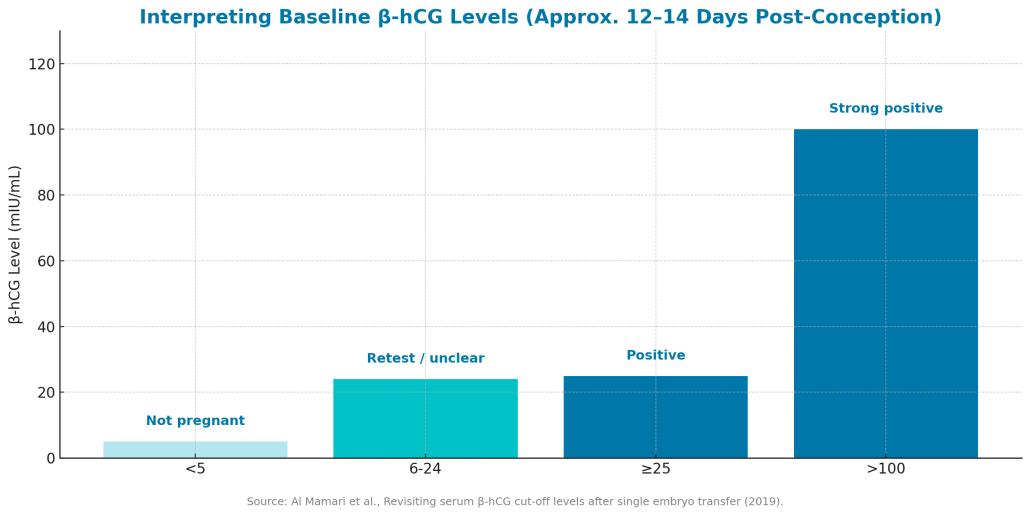What is the Two Week Wait? And What to Expect

In the context of in vitro fertilization (IVF), the two-week wait, AKA “TWW,” refers to the time between your embryo transfer and your scheduled pregnancy blood test, known as your “beta-hCG.”
During this period, the embryo, if it is going to implant, attaches to the uterine lining and begins to grow.
Although the name suggests an exact 14 days, the length of this waiting period can vary slightly depending on whether you had a fresh or frozen transfer and how developed the embryo was when transferred (for example, a day 3 vs. day 5 blastocyst).
In most IVF cycles, the pregnancy test is scheduled around 9 to 14 days after transfer.
Post-Transfer Care and Daily Schedule
While the embryo transfer marks the final major step of the IVF process, your medical care continues during the two-week wait.
Most patients remain on supportive medications, such as progesterone and estrogen, to optimize the uterine environment for implantation.
Here is an example of what a post-transfer medication and testing schedule might look like:
- Day 17: Embryo transfer + progesterone + estrogen
- Days 18–23: Continue progesterone + estrogen
- Day 24: Blood test to check hormone levels
- Day 25: Continue medications
- Day 26: Pregnancy blood test
Your clinic may adjust this plan based on your individual needs.
Blood tests during this time are usually performed at a local lab if you are not near your fertility clinic. Results are often available the same day.
Self-Care During the Two-Week Wait
This waiting period can be emotionally and physically taxing. While there is no exact routine that will ensure a positive outcome, there are steps you can take to care for your body and mind.
Recommended practices:
- Drink plenty of non-caffeinated fluids
- Limit sugar and avoid artificial sweeteners
- Continue acupuncture or massage if already part of your routine
- Focus on stress-reducing activities and things you enjoy
- Engage in light physical activity like walking or gentle yoga
- Avoid heating pads or hot tubs
- Resume gentle sexual activity if you feel comfortable
- Continue all prescribed medications and prenatal vitamins as directed
- Check with your care team before starting any new medications or supplements
Activities to avoid:
- High-impact or high-intensity exercise
- Overexertion or heavy lifting
- Self-prescribing over-the-counter remedies without medical guidance
Can I have Sex During the Two-Week Wait?
Many patients wonder whether it is safe to have sex during the two-week wait after an embryo transfer.
In most cases, gentle sexual activity is considered safe unless your provider has given specific medical reasons to avoid it. Heavy spotting, risk of ovarian torsion, or certain uterine conditions can be contraindications.
Some clinics recommend abstaining for the first few days after transfer to reduce uterine contractions, while others have no restrictions.
If you do resume intimacy, opt for positions that are comfortable and avoid anything high-impact.
And as a rule of thumb, always follow your fertility clinic’s guidance.
Common Symptoms During the Two-Week Wait
Every patient’s experience is unique, and the symptoms, or absence of symptoms, do not necessarily predict the outcome.
Some common sensations during this period include:
- Constipation: Hormonal changes and medications can slow digestion. Increase fluid intake, and consider a stool softener if recommended by your provider.
- Fatigue: Your body may feel more tired as it supports possible implantation. Listen to your body and rest as needed.
- Spotting: Light spotting can occur and is not always a sign of concern. Contact your clinic if you experience heavy bleeding similar to a period.
- Bloating or mild cramping: These are often related to the medications and stimulation cycle. Extra Strength Tylenol can be taken if needed, following package instructions. Contact your provider if the pain becomes severe.
The “Beta-hCG” Pregnancy Test
The official pregnancy test after IVF is a blood test that measures human chorionic gonadotropin (hCG) levels. Home urine tests are discouraged during the two-week wait, as they can lead to inaccurate results and unnecessary stress.
If the blood test is positive, your clinic will usually repeat it in two to three days to ensure that hCG levels are rising appropriately.
About a week later, an ultrasound is scheduled to confirm the implantation site and the presence of a growing gestational sac. A fetal heartbeat is typically visible around six weeks of gestation.
Understanding your beta hCG levels during the two week wait
Understanding your first beta hCG result can feel overwhelming, so it may help to use general ranges as a reference point.
A value under 5 mIU/mL is typically considered negative for pregnancy, while a level of 6–24 mIU/mL falls into a gray zone where a repeat test is needed to see if levels rise as expected.
A result of 25 mIU/mL or higher is generally considered positive, and levels above 100 mIU/mL at this stage are often viewed as a reassuring sign.
In some cases, very high early numbers may also suggest a multiple pregnancy, which would be confirmed through ultrasound.

What Happens Next If the Pregnancy Test Is Positive
If your beta-hCG test comes back positive, your clinic will typically schedule a repeat blood test in 48–72 hours. Early pregnancy is evaluated not just by the first number, but by how quickly hCG rises.
In a healthy early pregnancy, hCG should rise by about 60–100% every 48–72 hours. What matters most is the upward trend. This repeat “beta” helps your care team confirm that implantation is progressing normally.
If your second beta shows an appropriate rise, your clinic will continue your supportive medications and schedule the next milestone:
Around 5 weeks gestation: An ultrasound may be done to confirm a gestational sac.
Around 6–7 weeks gestation: A follow-up ultrasound is performed to look for a fetal heartbeat, which is the key indicator of an early, developing pregnancy.
If the Pregnancy Test is Negative
If the test shows no pregnancy, your care team will advise you on which medications to stop and which to continue, if any. Your period will usually start within a few days. You may begin planning for another IVF cycle as soon as you feel medically, emotionally, and financially ready,
A negative test can be difficult to process. Give yourself time and space to grieve, and reach out for support from your partner, friends, family, or a counselor specializing in fertility issues.
Coping with the Emotional Side of the Two-Week Wait
The two-week wait can be an emotional rollercoaster. The combination of hormonal changes, physical recovery, and uncertainty often makes this time especially challenging. Here are a few strategies that may help:
- Create a routine: Structure can help you manage anxiety and impatience about the seemingly slow passage of time. You might start the morning with a short walk or light yoga, set aside time for work or hobbies in the afternoon. Read, cook, meditate, get creative. Wind down with a favorite book or calming music in the evening. This time is all about staying grounded.
- Limit online searching: While it is tempting to look up every symptom, this can increase stress and muddy the already turbulent emotional waters with unclear answers.
- Stay connected: Talk to trusted friends, join a fertility support group, or connect with others who have shared in the IVF experience.
- Manage expectations: Remember that symptoms vary widely and are not a reliable indicator of success or failure.
What is the Two-Week Wait: The Takeaway
The two-week wait (TWW) is a time of hope, uncertainty, and patience. While it can feel long, it is an important stage in the IVF process when your body is working to establish a possible pregnancy.
By following your clinic’s medication schedule, practicing mindful self-care, and leaning on support systems, you can make this waiting period more manageable.
Regardless of the outcome, this is a period where you can be proud of your resilience and commitment to building the family you’ve been dreaming of.

